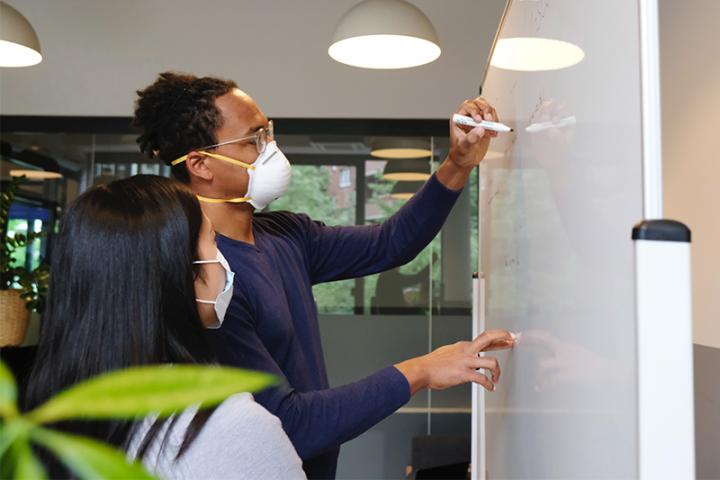
Disabilities, Face Masks, and the ADA
As we move through the phases of reopening, there is one thing that has become abundantly clear: people are confused about who can be required to wear a face mask, and what circumstances exempt someone from that requirement. At the Yang-Tan Institute on Employment & Disability, we have fielded many questions on this topic recently: can people with disabilities be exempt from wearing a face mask at work? What about in a school, training program, or store?
Each of these settings are covered by different Titles of the Americans with Disabilities Act (ADA). Title I covers employees with disabilities. Title II applies to the public sector (e.g. government funded programs, agencies and schools). And, title III applies to “places of public accommodation” like stores, banks, and restaurants. The scenario wheres someone might refuse to wear a mask citing ADA protections could look different in each setting. But the results are similar: a person with a disability or condition that makes it difficult to wear a mask might infect others with a potentially deadly disease, just like anyone else. This could constitute a “direct threat” to others as defined by the ADA. However, in all settings people with disabilities may be entitled to other accommodations or modifications that allow them to benefit equally from employment, goods and services, and other opportunities.
Below are three example scenarios that illustrate how to respond appropriately if someone refuses to wear a mask claiming a medical or disability-related exemption.
Employee returning to work
If an employee is returning to work in a setting where safe social distance can’t be maintained, they can be required to use a face covering for the safety of others. If an employee asks for a reasonable accommodation in relation to that policy because of a medical condition or disability, the employer should engage in an interactive dialogue to determine a safe alternative. Because the employee has requested an accommodation, the employer has the right to request medical documentation proving that wearing a face covering would not be possible. Every attempt should be made to find a solution that does not put the safety and wellbeing of the employee or others at risk. This could include allowing the employee to choose an alternate face covering such as a bandana or plastic face shield, exploring alternate schedules or remote work options, assigning a private workspace to limit time in a face covering, or exploring potential reassignment to a position that can be done remotely or in settings with less exposure to others.
Participant in a publicly funded training program
Some training and education programs require an essential in-person or onsite setting. Examples include cosmetology, construction, and nursing programs. Program participants can be required to wear a mask or face covering for the safety of others. A participant can request a reasonable modification to the mask policy, or another type of program modification that would allow them to participate in an alternate format. Again, the interactive dialogue is key, and involves negotiation to identify a solution that works for the participant, will be safe for everyone involved, and does not fundamentally alter the nature of the program. Solutions could include allowing a student to complete onsite practicum at a separate time without others present, identifying creative ways to provide remote instruction, or allowing alternate face covering like bandanas or plastic face shields.
A customer at a grocery store
Some shoppers have been entering stores without a face covering, and claiming that they cannot wear a mask due to a medical condition. It is important to sort out fact from fiction in these instances. Some people who object to masks are erroneously claiming that the ADA protects them from the requirement. In fact, the prevalence of these ‘mask-free cards’ led the Department of Justice to issue a news release that clarified:
“The ADA does not provide blanket exemption to people with disabilities from complying with legitimate safety requirements necessary for safe operation.”
It is critical to note that some people with disabilities or conditions are unable to wear a mask due to a legitimate health concern. Stores (and other places of public accommodation) should be able to offer alternative methods to receive goods and services. For example, a grocery store may offer online or phone orders, with curbside pick-up or delivery. If operationally feasible, shopping before or after hours when appropriate social distance can be observed may be another alternative. It is important to note that private businesses cannot just refuse service. At least one of the alternatives offered should be no-cost, to avoid imposing an unintentional surcharge on patrons with disabilities. As in all situations, people can be permitted to use other types of face coverings like face shields or bandanas. Just keep the conversation solution-focused, and avoid debating about whether or not the person in question has a disability.
Key takeaways
Simple solutions are often the best. The most important thing is to engage in a dialogue to establish an option that might work, knowing that in some cases accommodation might not be possible due the risk involved. For more information on the ADA and COVID-19 visit: https://www.northeastada.org/blog/what-the-ada-tells-us-about-accessibility-when-implementing-covid-19-regulations



